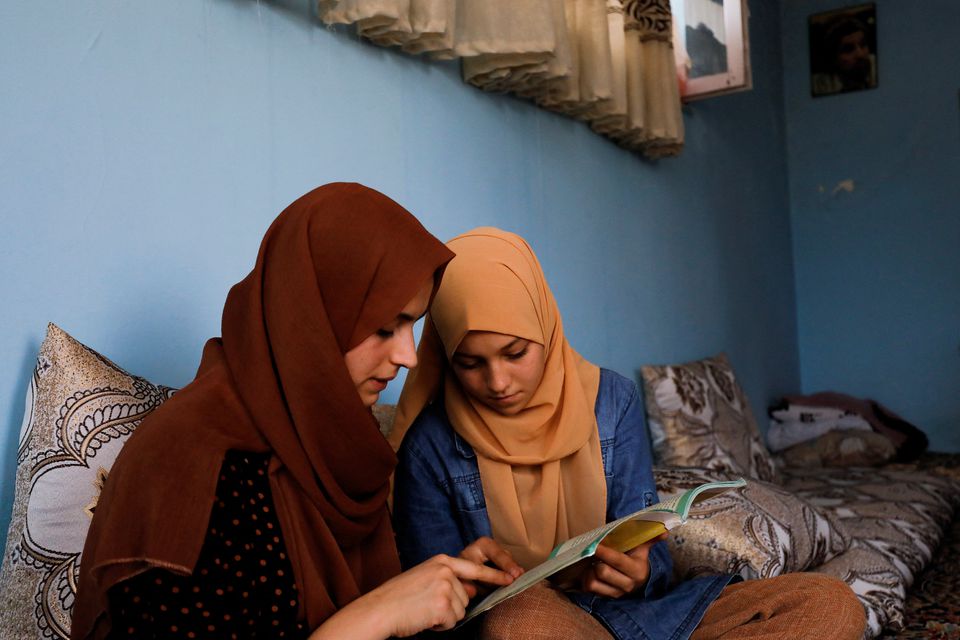Afghanistan: The History Of Secret Education For Girls
Aug 27, 2022 | Pratirodh Bureau
Kerishma Rasheedi, 16, and her friend Bereshna Hesar study at her house in Kabul, Afghanistan on August 3, 2022 (Reuters)
In August 2021, the Taliban seized power in Afghanistan, and since then secondary education for girls in the country has been banned. However, there have been reports of clandestine girls’ schools operating despite the ban. Teenage girls are reportedly taking extraordinary risks to attend lessons. Their teachers bravely share knowledge, even if they do not have extensive experience or the backup of an education system.
Education for girls was also banned during the previous era of Taliban rule in Afghanistan (1996-2001). In this period, too, girls attended secret schools.
Not much was known about these schools during Taliban rule. A 1997 report noted that the Swedish Committee for Afghanistan supported 125 girls’ schools and 87 co-education primary schools and home schools. An article in the Guardian in July 2001 stated that aid agencies had estimated 45,000 children were attending secret schools.
After the defeat of the Taliban in 2001, the educational work of the Revolutionary Association of Women of Afghanistan (RAWA), which they carried out during Taliban rule, was much documented.
Before 9/11, there was very limited international knowledge of these secret schools for girls. But after 9/11, the misogynistic actions of the Taliban regarding women’s rights and girls’ education became a pillar of the argument for the US War against Terror.
When visiting Afghanistan in December 2001, UNICEF executive director Carole Bellamy referenced secret schools as part of a call for aid funding. The existence of these schools exerted considerable symbolic power.
A Symbolic Role
Since the 1960s, the education of girls has been promoted in international development and aid policy as a way to limit population, address economic growth, or attend to political stabilisation. Girls and their education have been portrayed as a development intervention and a “good buy” for project funding. The argument runs that when women are educated and in work, they contribute to reducing poverty, enhancing the health of their children, and promoting social and cultural cohesion.
But these policies can fail to address or inquire into the needs, rights or capabilities of girls themselves, or the wider conditions of gender and intersecting inequalities. They are often promoted without any sustained engagement with wider policy goals for gender equality or women’s rights.
A commitment to women’s education can be hampered by insufficient long-term funding for broader gender equality initiatives, as well as an inadequate representation of gender equality concerns in peace-making discussions. They mean that even when girls return to school in large numbers, practices inside and outside education can still reflect the social divisions and gender inequalities that preceded the conflict.
In November 2001, Laura Bush, the wife of US president George W Bush, made a high profile radio address condemning the “severe repression and brutality against women in Afghanistan”. “The fight against terrorism is also a fight for the rights and dignity of women,” she said. War was justified because of the Taliban’s ban on girls’ access to school. A narrative emerged of the need to “save” Muslim women.
One consequence of this was the risk that conservative groups in Afghanistan could link the education of women and other women’s rights measures to American aggression and colonial or geo-political ambitions – meaning that a future anti-American movement could also look to restrict these rights.
Nevertheless, in the post-Taliban era (2002-2021), a huge expansion of education took place in Afghanistan, with many important initiatives in girls’ education and women’s rights. Profound social divisions remained, though, and many girls still lacked schooling.
The Taliban seizure of power in August 2021 halted the growth of secondary and tertiary education for young women that had taken place over two decades. Promises made by the Taliban about reopening schools in 2022 were retracted.
In contrast to the limited reports on clandestine girls’ schools in the 1990s, many accounts are now circulating of secret schools. The more extensive reporting may come from better opportunities to share information using new technologies, or from the initiatives of educated girls and women.
But, to date, there has been no systematic analysis of these reports. There are reported divisions among the Taliban leadership on how, or under what conditions, girls should be in secondary school and university.
The fragmentary reports mean it is difficult to know who can and cannot attend clandestine schools, what the girls in these schools can and cannot do, and who is financing them.
Wider Gender Equality
In the 2000s, education for women became part of the narrative behind the War on Terror. Today, the positioning of girls’ schooling, gender and women’s rights in the process of peacebuilding remains a work in progress.
Key international organisations which oversee the allocation of funding and consult widely on strategic direction regarding education and gender equality are developing more wide-ranging policy on gender equality and women’s rights. An example of this is the UN’s Education Cannot Wait. According to its website, Education Cannot Wait is active in Afghanistan.
But one kind of initiative is seldom enough. Many coordinated processes are needed. These processes of global cooperation and policy direction are cumbersome and far away from the pressing needs and wishes of girls locked out of school in Afghanistan, but they are a necessary step.
The debate continues as to whether girls’ education alone is an approach which will allow other transformations to follow – or whether it is just a limited intervention, which can be undertaken without engaging the politics of peacebuilding that would secure a stronger foundation for women’s rights.
(This article is republished from The Conversation under a Creative Commons license. Read the original article.)
